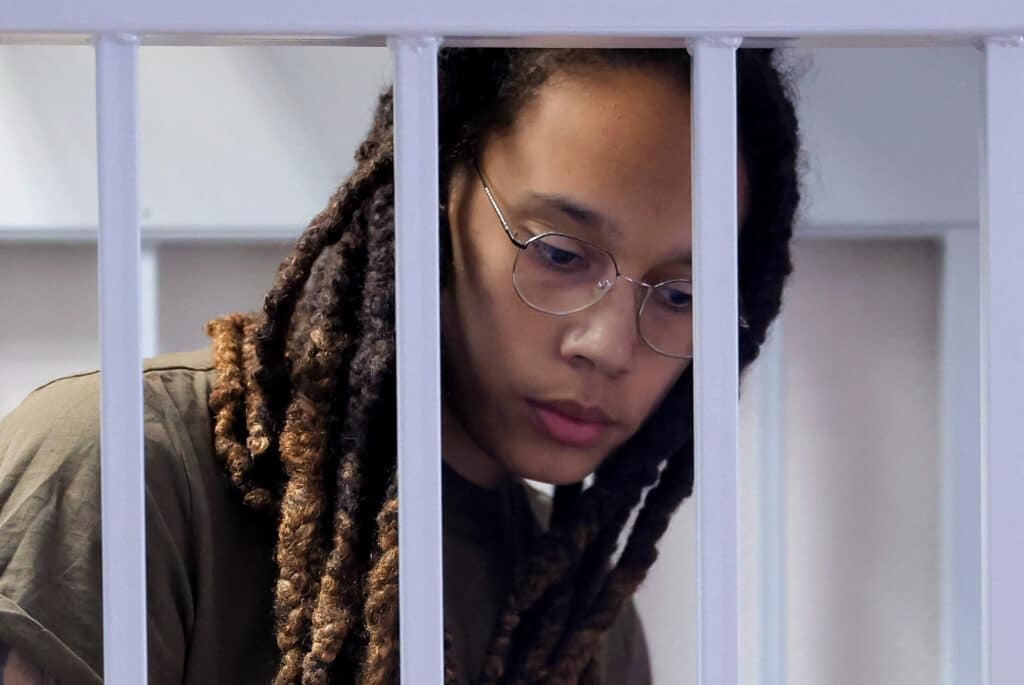Brittney Griner just revealed that she contemplated suicide in the early days of her detainment in Russia.
In the near 10 months the WNBA star was held, she admits there were dark thoughts in her head.
Speaking during a special ABC News report on 20/20 that aired Wednesday, the star said, “I did. I didn’t think I could get through what I needed to get through.”
In the end, the star said she battled those thoughts and admitted to herself, “I have to endure this.”
Griner, 33, a nine-time WNBA All-Star and two-time Olympic gold medalist, was stopped at a security checkpoint in February 2022. Two cartridges of cannabis oil, a legal substance in Arizona, where she lives and plays for the Phoenix Mercury, were found in her backpack when she landed in Russia, where possession of cannabis is a serious offense.
The player was issued drug-related charges and faced up to 10 years in a notorious penal colony.
During the long interview with Robin Roberts, the star became a bit emotional describing her fear of and the conditions she faced with the though of never coming back to the United Sates.
Griner also read excerpts of her memoir, “Coming Home,” which recounts her detention in Russia and will be released Tuesday.
The WNBA player said in the end, she did not realize the cannabis, which she uses to manage pain, was in her luggage as she hastily packed her bag after waking up late.
As she was headed to a connecting flight at the Moscow airport, she was stopped at a security checkpoint, where the cannabis oil was found.
Griner said “I knew that” cannabis was illegal in Russia. “Honest to God,” she read from her book, “I just totally forgot the pen was in my bag.”

Realizing she had the cannabis was “like an elevator just dropped from under my feet,” she told Roberts. “My life is over right here. … How was I this absent-minded to make this huge mistake? I could visualize everything I worked for just crumbling.”
After detainment, she player described frantically texting her wife, Cherelle Griner, and her agent to seek help.
Griner said she ripped apart one of the few T-shirts she was allowed in her cell to use as a washcloth to instead use as “toilet paper.”
“I felt less than human,” she said.
A week later, Russia invaded Ukraine, and “I felt like I was never coming home.”
Griner admits that her cell was “filth” with “dirt and grime and a leaky sink. Blood stains.”
Breakfast there was porridge “that was more like cement” and dinner was “a little piece of fish full of bones,” she said.
“I wanted to take my life more than once,” she said, reading from her book. “I felt like leaving here so badly.”

Griner even admits that she was left outside in the winter of Russia for up to two hours at a time. She went to trial after 134 days and pleaded guilty.
“The guilty plea was to take ownership of what happened,” Griner said.
She was sentenced to nine years and sent to an even harsher penal colony.
“I was just so scared because of so much unknown,” Griner said. She said the new place was frigid. She shared an open space with up to 60 women.
There was even one bathroom with three toilets and no hot water.
While the harrowing experience is behind her, she said she still deals with racist and homophobic jeers, either in person or via social media.
“It’s been going on for a while,” Griner said. “I try to forget. That used to work until I realized suppressing things is not the way to go. But I know who I am, and the village I have, the people around me, know who I am. And that’s enough for me.”
She also went on to admit, “I don’t think I’ve really gotten through it all the way,” Griner said. “I let everybody down. I try to give myself grace. People say I should give myself some grace. It’s just so hard for me to do that.”
If you or someone you know is in crisis, call or text 988 to reach the Suicide and Crisis Lifeline or chat live at 988lifeline.org. You can also visit SpeakingOfSuicide.com/resources for additional support.

